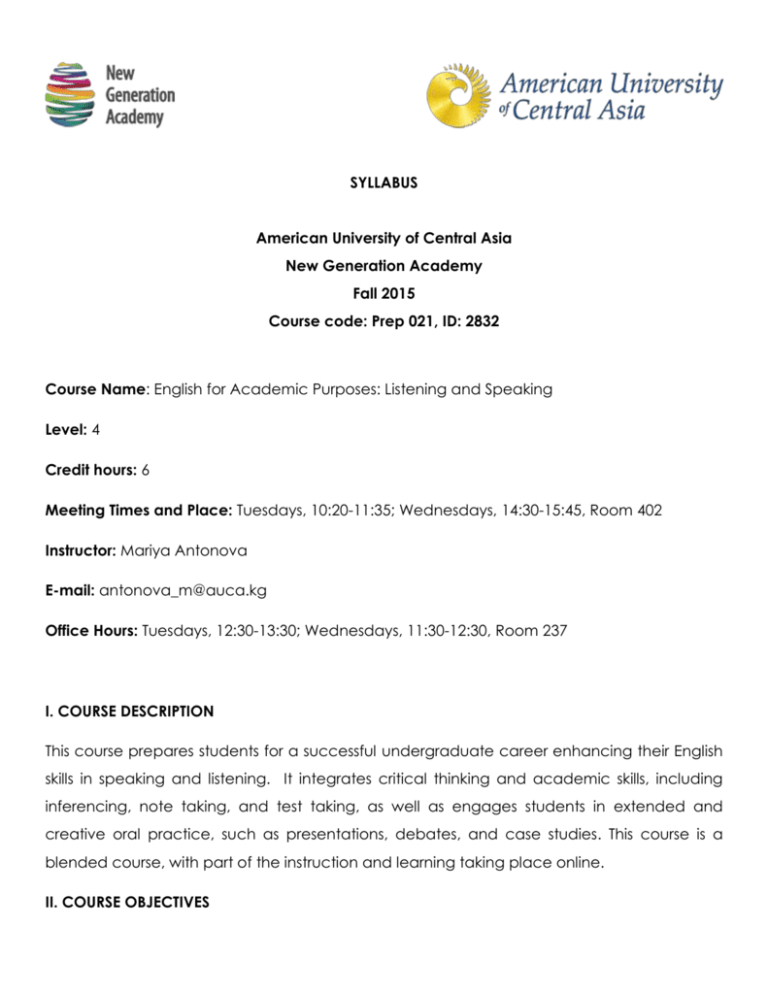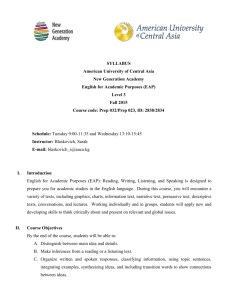
SYLLABUS
American University of Central Asia
New Generation Academy
Fall 2015
Course code: Prep 021, ID: 2832
Course Name: English for Academic Purposes: Listening and Speaking
Level: 4
Credit hours: 6
Meeting Times and Place: Tuesdays, 10:20-11:35; Wednesdays, 14:30-15:45, Room 402
Instructor: Mariya Antonova
E-mail: antonova_m@auca.kg
Office Hours: Tuesdays, 12:30-13:30; Wednesdays, 11:30-12:30, Room 237
I. COURSE DESCRIPTION
This course prepares students for a successful undergraduate career enhancing their English
skills in speaking and listening. It integrates critical thinking and academic skills, including
inferencing, note taking, and test taking, as well as engages students in extended and
creative oral practice, such as presentations, debates, and case studies. This course is a
blended course, with part of the instruction and learning taking place online.
II. COURSE OBJECTIVES
In this course, you will
comprehend main ideas and details in longer audio pieces, such as interviews and
lectures, as well as infer information from them;
classify, organize, synthesize, summarize, and critically engage with information from
audio;
build and utilize a vocabulary base, including idiomatic expressions;
form, support and express opinions, and react to opinions of others;
construct and perform presentations in solo and teamwork projects;
speak using grammatically correct sentences, and identify and self-correct common
grammatical and mechanical errors.
III. TEXTS AND MATERIALS
1. English, Andrew K., and Laura Monahon English. NorthStar: Listening and Speaking Level 4.
New York: Pearson Longman, 2009. Print.
2. Extra: extra materials will be distributed in class as handouts or via the e-course.
IV. GRADING
Graded are given based on the following points system:
Activity/Assignment
Points
Speaking Club (P)
50
In-class Participation
100
Independent Research Presentation
100
Group Research Presentation
100
Mid-term Group Debate
100
Listening Test
50
Total
500
Grade/Percentage Ratio:
Points
Percent
Grade
450-500
90-100%
A/A-
400-449
80-89%
B+/B/B-
350-399
70-79%
C+/C/C-
300-349
60-69%
D+/D/D-
>349
0-59%
F
V. COURSE PROTOCOL
Learning etiquette
We practice collaborative learning, which means that students learn not only from the
instructor, but also from each other. To that end, you must give each other your full respect
and attention, listen to one another carefully, and strive for successful collaboration with one
another.
Online Access
Each student should have regular access to the Internet and must register for the e-course in
the first week of classes. The enrollment code for this class is 0312015. The majority of
electronic communication for this class will be done through the e-course.
Materials
Please bring your textbook, notebook and pen to every class.
Attendance
Students are not allowed to be late to class. Even if they are one minute late, they will not be
admitted to class and considered absent. You are allowed 5 absences total (whether
excused or unexcused) per semester. More than 5 absences will result in an F for the course.
If you miss a class, you are responsible for finding out from your classmates or the instructor
what you missed and making up any work, as needed.
Also, students are not permitted to leave the classroom during class time.
Participation:
You are expected to actively participate in the activities, both online and in class. As it is a
communication-based course, participation counts for 20% of your total grade for this
course.
Listening Assignments
You are to listen to the provided listening assignments and look up the unfamiliar words
BEFORE coming to class.
Speaking Assignments
During the semester, you will have a variety of graded speaking assignments, such as
debates or presentations. The topics and graded criteria for those will be provided on the ecourse.
Making Up of Assignments
You are allowed to make up a graded speaking assignment only if you provide official
documentation explaining your absence.
Phones
All the phones are to be set on “silent” and PUT AWAY during the class.
Homework and Personal Issues
If you have ANY problem concerning the course material (not keeping up with the rest of the
class, questions regarding a home assignment, etc.), please discuss it immediately with your
instructor during office hours or outside the class.
Academic Honesty
All work submitted by a student must represent his/her own ideas. (S)he must not adopt or
reproduce
ideas,
words,
or
statements
of
another
person
without
appropriate
acknowledgment. A student must give credit to the originality of others and acknowledge
an indebtedness whenever he or she does any of the following:
Quotes another person's actual words, either oral or written;
Paraphrases another person's words, either oral or written;
Uses another person's idea, opinion, or theory; or
Borrows facts, statistics, or other illustrative material from work of the other student,
unless the information is common knowledge.
Please refer to the MLA citation rules on the e-course.
If you are found to have plagiarized any portion of an assignment or cheated on a test, you
will receive a failing grade for that assignment/test. This is non-negotiable. If you are found to
have plagiarized multiple assignments, you will fail the course regardless of your grades on
other activities and assignments.
VI. COURSE SCHEDULE
Topics
Listening Activities
Speaking Activities
1. Information Overload
Listening for main ideas
Summarizing points
and details
Expressing and
Providing evidence to
defending opinions
support answers
Relating listenings to
personal values
2. The Achilles Heel
Relating listening to
Posing questions to
knowledge of the world
classmates re: their
Identifying connecting
reports
themes between two
Planning and giving a
listenings
three-minute speech
Listening to classmates’
reports
3. Early to Bed, Early to
Interpreting speakers’
Making contrastive
Rise
tone and emotions
statements
Comparing information
Interrupting politely to
from two audio sources
clarify or confirm
Identifying emphasis in
information
speech
Using idiomatic
expressions
4. Animal Intelligence
5. Longevity
Inferring speakers’
Asking for and giving
attitudes Listening for
examples
specific information
Reporting on research
Inferring word meaning
Evaluating the opinion of
from context
others
Identifying speakers’
Restating information for
feelings
clarification
Inferring information not
Restarting statements
explicit in the interview
Using synonyms
*The instructor reserves the right to amend this syllabus. Students will be informed of the
changes in class, and the amended version of the syllabus will be posted on the e-course.








